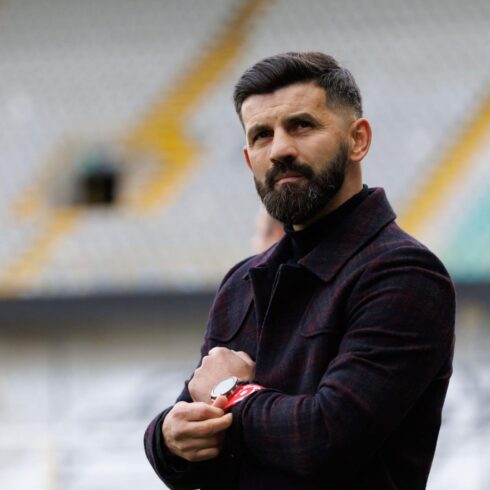On Sunday, Miron Muslic will attempt what many in football consider nearly impossible—leading his struggling Plymouth Argyle side to a historic FA Cup victory over Premier League giants Liverpool. Yet, for Muslic, who once fled war-torn Bosnia as a child, overcoming adversity is nothing new.
Muslic Fleeing War: A Childhood of Survival
Miron Muslic’s journey to the touchline began far from the football pitch. Born in Bihac, Bosnia, his life took a dramatic turn in 1992 when, at just nine years old, he and his family were forced to flee their homeland overnight. As Serbian-led forces laid siege to Bihac, the Muslics embarked on a 400-mile journey to Austria, leaving behind everything they knew.
“We had to leave Bosnia, and Bihac, our hometown, literally overnight, grabbing things you can grab with your hands,” Muslic recalls. “That’s where our new life started.”
Arriving in Innsbruck, Austria, with no knowledge of the local language and no certainty about their future, Muslic’s family faced immense challenges. His father worked as a waiter for over 30 years, while his mother took on cleaning jobs to provide for their children. Despite the hardships, Muslic remained grateful, learning valuable lessons about resilience and determination.
A Footballing Passion That Transcended Borders
Amidst the struggles of adapting to a new life, football became Muslic’s refuge. The sport allowed him to connect with others beyond language barriers and cultural differences. His love for the game led him to join Wacker Innsbruck as a teenage forward before playing across Austria’s football divisions and a brief stint in Croatia.
“That’s why football is so important, because it’s universal,” he explains. “On the pitch, it’s not about your last name, your nationality, or your refugee status. It’s just about the game.”
Through sheer perseverance, Muslic transitioned from player to coach, working his way up the Austrian football system before taking on coaching roles in Switzerland and Germany. His passion for the game and leadership qualities made him a natural fit for Plymouth Argyle, where he replaced Wayne Rooney as head coach last month.
A Steep Challenge at Plymouth Argyle
Muslic’s arrival at Plymouth coincided with a crisis. The club was bottom of the Championship, struggling for form, and battling relegation. To make matters worse, he lost two of his best players—Lewis Gibson and Morgan Whittaker—during the January transfer window.
Despite the bleak circumstances, Muslic remained steadfast. He orchestrated a morale-boosting victory against play-off contenders West Bromwich Albion last weekend, ending a miserable 15-game winless streak. The club also made an ambitious move by signing Ukrainian defender Maksym Talovierov for a record fee, signaling their intent to fight for survival.
For Muslic, adversity is nothing new. “I’ve been in more challenging situations in my life than being a head coach and facing a possible defeat at the weekend,” he says. His message to his players is simple: “Life is a struggle with beautiful surprises, and there is always something worth fighting for.”
The Ultimate Test: Facing Liverpool in the FA Cup
Now, Muslic faces his biggest challenge yet—taking on a Liverpool side that is flying high under Arne Slot, leading the Premier League and dominating in Europe. On paper, the odds are overwhelmingly against Plymouth. But if there’s one thing Muslic’s life has shown, it’s that the impossible can be achieved through belief and commitment.
His inspirational first speech to Plymouth’s players, which went viral on social media, encapsulated his philosophy: “Nothing is impossible if you truly believe, if you commit, if you convince, and if you go really, really fully.”
Whether Plymouth pulls off a miraculous upset or falls to Liverpool’s superior quality, Muslic has already won in many ways. His journey—from a refugee escaping war to a head coach leading a team against one of the biggest clubs in the world—is a testament to the power of resilience, hope, and football’s ability to unite people across borders.
“If I look to the locker room of Argyle, they are just lads from all over the world, and it works,” he says. “So imagine the world as a locker room; it would be a good place to be.”














